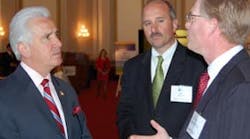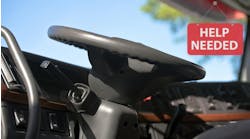WASHINGTON D.C. To combat its often negative image as a “dirty” and inefficient source of energy, the diesel-fuel advocacy group Diesel Technology Forum (DTF) hosted a special event on Capitol Hill here to bring together members of Congress and elements of the diesel industry and show off how current diesel-based power systems can curb pollution and reduce overall fuel consumption.
“When people think of ways to address climate change and energy security, they typically think of solar power, wind power, things that are new and different,” Allen Schaeffer, DTF executive director, told FleetOwner.
“The question we need to ask, however, is what technologies can we deploy now on a widespread scale that can conserve energy and reduce greenhouse gases – and the basic solution of Clean Diesel exists today, right under our nose,” he said.
“Diesel-power cars get 10 to 20% better fuel economy than gasoline-powered models, yet produce less CO2 [carbon dioxide – a greenhouse gas]. Starting in 2010, commercial trucks will produce practically no emissions and be more fuel efficient,” Schaefer pointed out. “Finally, we can retrofit older equipment to significantly reduce emissions as well. We’re well ahead of the climate change and energy security game than we realize by using diesel.”
At the special event – held at the Cannon House Office Building and entitled “Climate, Energy & the Environment: The Role of Diesel” – lawmakers from both sides of the aisle mingled with representatives from Caterpillar, John Deere, Eaton, Cummins, Volkswagen, Daimler, Bosch, Volvo Powertrain and others to review the latest advances in diesel technology.
“We need to get all the facets of the economy together when we talk about the vital role diesel plays,” said Rep. Jim Costa (D-CA). “About 90% of our commercial trucks are powered by diesel, along with two-thirds of our farm equipment. That’s why Clean Diesel [technology] must be part of our sustainable energy future in America.”
In Costa’s view, maintaining the fuel efficiency advantages of the diesel engine while significantly reducing emissions – via either new technology or retrofits to existing equipment – is an essential step to forming a 21st century energy policy for America. “It’s smart economically and it’s smart environmentally,” he added.
“Folks don’t understand the impact diesel has on our economy,” stressed Rep. Bob Etheridge (D-NC) “We have to make it economical for [owners and operators] to transition to newer and cleaner diesel trucks and equipment, or retrofit older equipment out there.”
Yet John Shimkus (R-IL) noted that the “negative public perception of diesel” must still be dealt with in America. That, however, can be addressed by focusing on the recent and continuing advances being made to make diesel technology that much more cleaner and efficient, said Mary Bono Mack (R-CA)
“We’ve got to realize how far we’ve come with diesel technology,” Mack said. “I believe in the innovation that’s going on now [with diesel systems] and moving forward with them.” She added that to realize a vision of reduced fuel consumption and lower emissions from vehicles in America, “Clean Diesel must be part of the solution.”
“Conserving energy through the use of more fuel efficient technologies cannot wait decades,” stressed DTF’s Schaeffer. “From new clean diesel cars to big-rig trucks and off-road construction and farm equipment, a new generation of Clean Diesel technology is in place, using a combination of ultra-low sulfur diesel fuel; advanced, fuel efficient diesel engines; and highly effective emissions controls. Clean Diesel technology is an alternative energy source that can play a leading role in addressing these challenges.”
View Fleet Owner's Video Interview: The benefits of diesel hybrids



